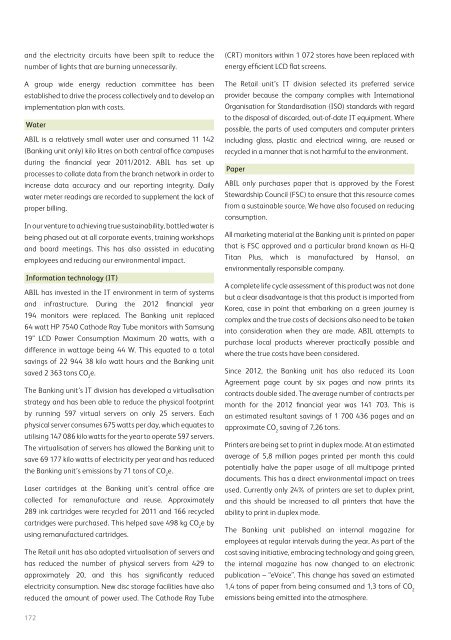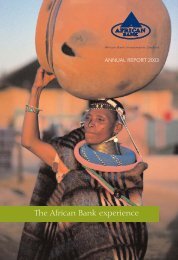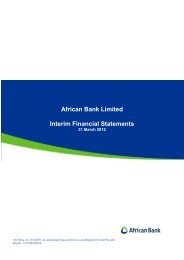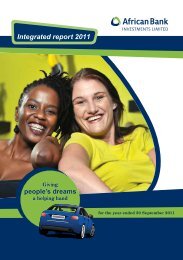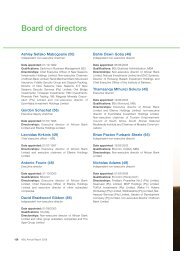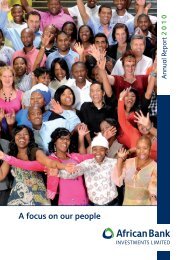Full annual report - African Bank - Investoreports
Full annual report - African Bank - Investoreports
Full annual report - African Bank - Investoreports
You also want an ePaper? Increase the reach of your titles
YUMPU automatically turns print PDFs into web optimized ePapers that Google loves.
and the electricity circuits have been spilt to reduce the<br />
number of lights that are burning unnecessarily.<br />
A group wide energy reduction committee has been<br />
established to drive the process collectively and to develop an<br />
implementation plan with costs.<br />
Water<br />
ABIL is a relatively small water user and consumed 11 142<br />
(<strong>Bank</strong>ing unit only) kilo litres on both central office campuses<br />
during the financial year 2011/2012. ABIL has set up<br />
processes to collate data from the branch network in order to<br />
increase data accuracy and our <strong>report</strong>ing integrity. Daily<br />
water meter readings are recorded to supplement the lack of<br />
proper billing.<br />
In our venture to achieving true sustainability, bottled water is<br />
being phased out at all corporate events, training workshops<br />
and board meetings. This has also assisted in educating<br />
employees and reducing our environmental impact.<br />
Information technology (IT)<br />
ABIL has invested in the IT environment in term of systems<br />
and infrastructure. During the 2012 financial year<br />
194 monitors were replaced. The <strong>Bank</strong>ing unit replaced<br />
64 watt HP 7540 Cathode Ray Tube monitors with Samsung<br />
19” LCD Power Consumption Maximum 20 watts, with a<br />
difference in wattage being 44 W. This equated to a total<br />
savings of 22 944 38 kilo watt hours and the <strong>Bank</strong>ing unit<br />
saved 2 363 tons CO e. 2<br />
The <strong>Bank</strong>ing unit’s IT division has developed a virtualisation<br />
strategy and has been able to reduce the physical footprint<br />
by running 597 virtual servers on only 25 servers. Each<br />
physical server consumes 675 watts per day, which equates to<br />
utilising 147 086 kilo watts for the year to operate 597 servers.<br />
The virtualisation of servers has allowed the <strong>Bank</strong>ing unit to<br />
save 69 177 kilo watts of electricity per year and has reduced<br />
the <strong>Bank</strong>ing unit’s emissions by 71 tons of CO e. 2<br />
Laser cartridges at the <strong>Bank</strong>ing unit’s central office are<br />
collected for remanufacture and reuse. Approximately<br />
289 ink cartridges were recycled for 2011 and 166 recycled<br />
cartridges were purchased. This helped save 498 kg CO e by 2<br />
using remanufactured cartridges.<br />
The Retail unit has also adopted virtualisation of servers and<br />
has reduced the number of physical servers from 429 to<br />
approximately 20, and this has significantly reduced<br />
electricity consumption. New disc storage facilities have also<br />
reduced the amount of power used. The Cathode Ray Tube<br />
172<br />
(CRT) monitors within 1 072 stores have been replaced with<br />
energy efficient LCD flat screens.<br />
The Retail unit’s IT division selected its preferred service<br />
provider because the company complies with International<br />
Organisation for Standardisation (ISO) standards with regard<br />
to the disposal of discarded, out-of-date IT equipment. Where<br />
possible, the parts of used computers and computer printers<br />
including glass, plastic and electrical wiring, are reused or<br />
recycled in a manner that is not harmful to the environment.<br />
Paper<br />
ABIL only purchases paper that is approved by the Forest<br />
Stewardship Council (FSC) to ensure that this resource comes<br />
from a sustainable source. We have also focused on reducing<br />
consumption.<br />
All marketing material at the <strong>Bank</strong>ing unit is printed on paper<br />
that is FSC approved and a particular brand known as Hi-Q<br />
Titan Plus, which is manufactured by Hansol, an<br />
environmentally responsible company.<br />
A complete life cycle assessment of this product was not done<br />
but a clear disadvantage is that this product is imported from<br />
Korea, case in point that embarking on a green journey is<br />
complex and the true costs of decisions also need to be taken<br />
into consideration when they are made. ABIL attempts to<br />
purchase local products wherever practically possible and<br />
where the true costs have been considered.<br />
Since 2012, the <strong>Bank</strong>ing unit has also reduced its Loan<br />
Agreement page count by six pages and now prints its<br />
contracts double sided. The average number of contracts per<br />
month for the 2012 financial year was 141 703. This is<br />
an estimated resultant savings of 1 700 436 pages and an<br />
approximate CO saving of 7,26 tons.<br />
2<br />
Printers are being set to print in duplex mode. At an estimated<br />
average of 5,8 million pages printed per month this could<br />
potentially halve the paper usage of all multipage printed<br />
documents. This has a direct environmental impact on trees<br />
used. Currently only 24% of printers are set to duplex print,<br />
and this should be increased to all printers that have the<br />
ability to print in duplex mode.<br />
The <strong>Bank</strong>ing unit published an internal magazine for<br />
employees at regular intervals during the year. As part of the<br />
cost saving initiative, embracing technology and going green,<br />
the internal magazine has now changed to an electronic<br />
publication – “eVoice”. This change has saved an estimated<br />
1,4 tons of paper from being consumed and 1,3 tons of CO2 emissions being emitted into the atmosphere.


